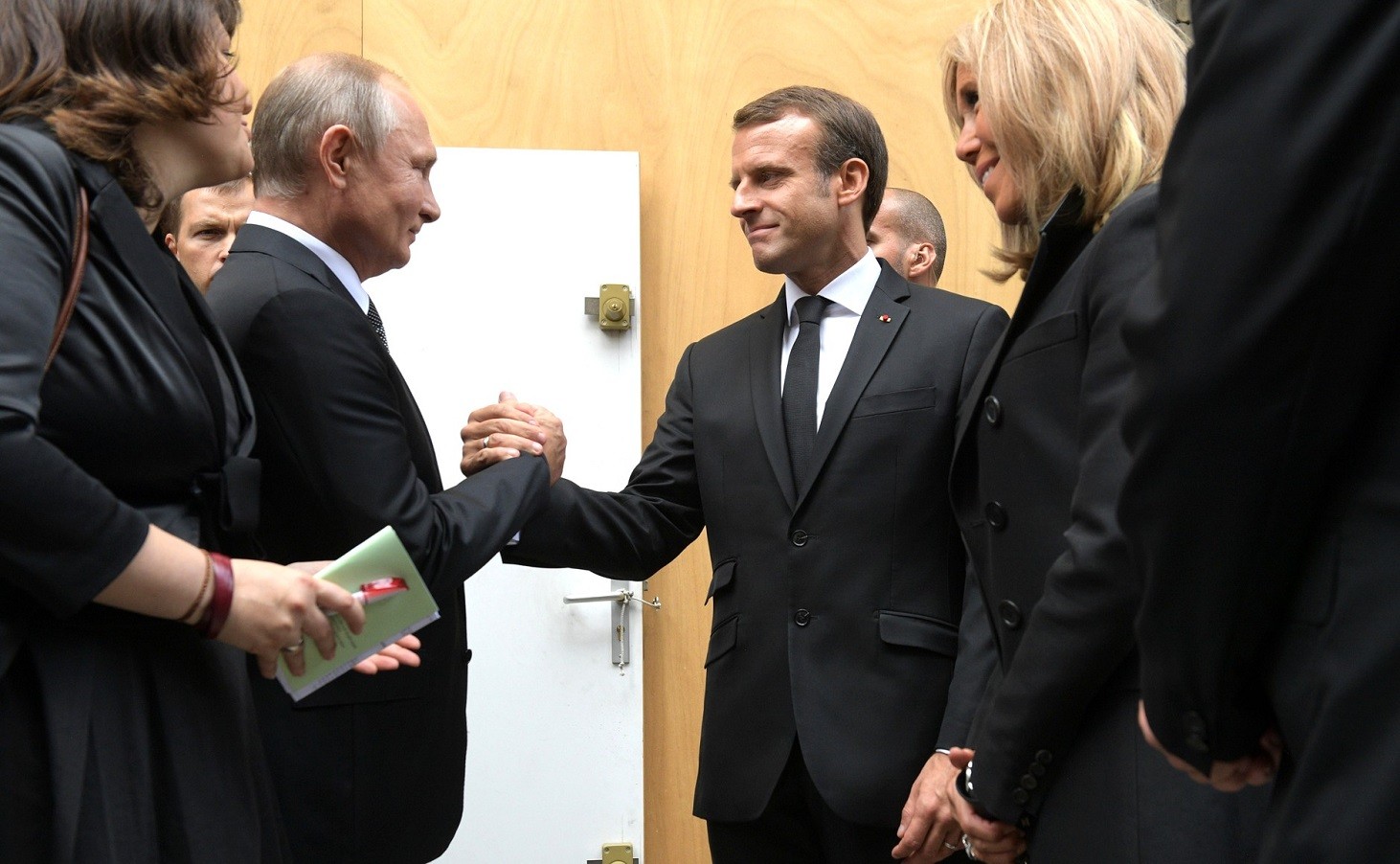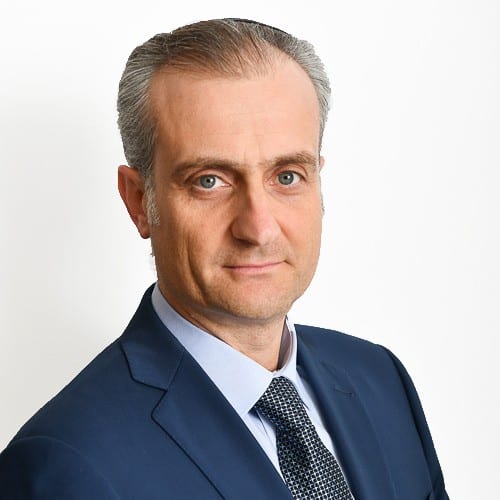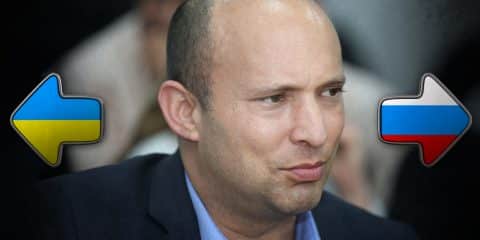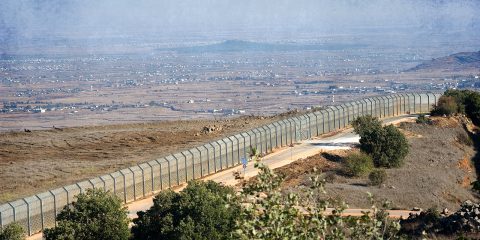המתיחות הגאופוליטית בין אירופה לרוסיה מעמידה את ישראל במצב מורכב, משום שמנהיגי אירופה מצפים מישראל לגנות את פוטין על מעשיו, אך מצד שני ישראל נזהרת מלפגוע ביחסיה עם רוסיה על מנת לקבל חופש פעולה בשמי סוריה.
נשיא צרפת, עמנואל מקרון, הודיע לאחרונה כי בכוונתו לפתוח בדיאלוג עם רוסיה, בטענה שרק שמירת ערוץ ההידברות בין רוסיה לבין אירופה תשכנע את רוסיה לצמצם את שיתוף הפעולה שלה עם סין, ואת השאיפות שלה במזרח אירופה. כחלק מההידברות הזו אירח מקרון את פוטין בצרפת והסכים להזמין את רוסיה לפסגת ה-G7 ב-2020. מדיניות זו היא פועל יוצא של גישה פרו-רוסית המאפיינת את הדיפלומטיה הצרפתית מאז הברית בין שתי המדינות בסוף המאה ה-19, הלחימה המשותפת שלהן נגד גרמניה במלחמת העולם הראשונה והשנייה, והטינה של שתי המדינות כלפי ההגמוניה האמריקאית לאחר מלחמת העולם השנייה.
אומנם מקרון הדגיש כי במסגרת ההידברות שלו עם רוסיה הוא לא יוותר על פרוטוקול מינסק (הסכם שאמור לשים קץ לשליטה הרוסית במזרח אוקראינה), אך גישתו החדשה של מקרון עלולה להשליך על יחסי החוץ של ישראל כלפי רוסיה ואירופה.
היחסים בין אירופה לרוסיה הידרדרו מאז הפלישה הרוסית למזרה אוקראינה, הסיפוח של קרים, והטלת סנקציות כלכליות על ידי האיחוד האירופי. מנהיגי אירופה מותחים ביקורת גלויה על פוטין בשל חיסול מתנגדיו על אדמת אירופה, כמו גם בשל המעורבות שלו בפוליטיקה האירופית (הכוללת תמיכה במפלגות פופוליסטיות אשר מתנגדות לאיחוד האירופי), התערבותו בסוריה, והשתקת מתנגדיו מבית.
המתיחות הגאופוליטית בין אירופה לרוסיה מעמידה את ישראל במצב מורכב, משום שמנהיגי אירופה מצפים מישראל לגנות את פוטין על מעשיו, אך ישראל נזהרת מלפגוע ביחסיה עם רוסיה על מנת להמשיך ולקבל חופש פעולה יחסי בשמי סוריה.
מצד אחד, יש בין רוסיה לבין ישראל אינטרס משותף למנוע התלקחות בין חילות האוויר של שתי המדינות בסוריה; שתי המדינות רוצות במיגורן של המדינה האסלאמית ושל אל-קאעידה; שתיהן הסתייגו מנטישת המנהיגים הערביים החזקים על ידי ארה”ב בתקופת “האביב הערבי”. מצד שני, קיימים בין רוסיה לישראל אינטרסים גאופוליטיים סותרים. בניגוד לרוסיה, ישראל מעוניינת בשימור המעורבות האמריקאית במזרח התיכון, בעוד שמוסקבה תומכת בציר השיעי כנגד הברית שבין ארה”ב לבין המדינות הסוניות. מאז ההתערבות הרוסית בסוריה ב-2015, הנוכחות הרוסית הגבילה את חופש הפעולה של ישראל, גם אם ישראל ממשיכה לפעול בסוריה בהסכמת רוסיה.
ההסכמה בין ישראל לבין רוסיה לגבי סוריה מקבלת לעיתים ביטוי סמלי, למשל כאשר בנימין נתניהו היה אורח כבוד של פוטין ב-9 במאי 2018 לרגל חגיגות הניצחון של רוסיה במלחמת העולם השנייה. בסיום האירוע ניגנה התזמורת של הצבא הרוסי את “התקווה” – מחווה שלא הייתה עולה על הדעת בימים העוינים של המלחמה הקרה. מצד שני, העובדה שהחגיגות במוסקבה הוחרמו על ידי המנהיגים האירופיים מצביעה על מורכבות היחסים בין ישראל, רוסיה ואירופה.
ישראל לא גינתה את הפלישה הרוסית למזרח אוקראינה, את הסיפוח של קרים ואת הרעלתו של הסוכן הרוסי על אדמת בריטניה. ישראל שמרה על שתיקה בסוגיות רגישות אלו כדי לא להסתבך עם פוטין, גם אם מדינות אירופה היו מצפות מישראל לצרף את קולה לגינוין. בסוגיה הזו, ישראל העדיפה את חופש הפעולה שלה בשמי סוריה על פני יחסיה עם אירופה.
הדילמות של ישראל מול רוסיה ואירופה נעשו מורכבות עוד יותר עם הנסיגה האמריקאית מהמזרח התיכון, וליתר דיוק עם נטישת הכורדים בצפון סוריה והחלטתו של טרמפ שלא להגיב להתקפות של איראן על סעודיה. מדיניות זו רק מעצימה את המעמד האזורי של רוסיה, ולכן גם מגבירה את הצורך עבור ישראל לשמור על התיאום עם רוסיה ולהתחשב באינטרסים שלה. מצד אחד, היחסים עם אירופה חשובים לישראל: האיחוד האירופי הוא השותף המסחרי הראשון של ישראל, וישראל היא חברה ב-OECD. מצד שני, ישראל אינה יכולה להרשות לעצמה לפגוע ביחסיה עם רוסיה בשל תפקיד המפתח של רוסיה בסוריה.
על כן, הגישה החדשה של נשיא צרפת כלפי רוסיה עשויה להקל על ישראל. אלא שמדיניותו של מקרון, על מנת להיות יעילה, תצטרך לעמוד בשלושה תנאים: 1. מדינות נאט”ו (וגרמניה בראשן) תצטרכנה להגדיל את ההוצאות הביטחוניות שלהן; 2. על אירופה לאמץ וליישם מדיניות אנרגטית אחידה ולכידה כלפי רוסיה; 3. על אירופה להתנות כל השתתפות אפשרית בשיקומה של סוריה בדרישה מרוסיה לרסן את איראן בסוריה.
התנאי הראשון הינו צבאי. צרפת מוציאה כמעט 2% מן התל”ג שלה לביטחון (1.8% בדיוק), אך גרמניה רחוקה מזה (1.2% בלבד). הנשיא מקרון מדבר של בניית צבא אירופי, אך דיבורים כאלו יישארו חסרי משמעות כל עוד גרמניה לא תשקיע יותר בהוצאות הביטחון שלה. כאשר ממשל טרמפ מסתייג מברית נאט”ו, על אירופה לבנות יכולת צבאית אמינה ולהבהיר את היחסים בין “הצבא האירופי” לבין נאט”ו בטרם ההידברות של מקרון עם פוטין.
התנאי השני קשור לאנרגיה. רשמית, יש לאיחוד האירופי מדיניות של צמצום התלות בגז הטבעי של רוסיה, מדיניות שאמורה להתבצע בחזית אחידה. אולם בפועל, מדינות האיחוד נוטות כל אחת לדאוג לעצמה ולפעול באופן עצמאי. פרויקט ה-Nord Stream, למשל, מחבר ישירות בין רוסיה לבין גרמניה. חוסר הסולידריות בתחום האנרגטי מקל על מדיניות ה”הפרד ומשול” של פוטין. אירופה יכולה להגדיל את ייצור הגז שלה באמצעות גז מפְּצָלים, אך שיטה זו אסורה ברוב מדינות האיחוד האירופאי.
התנאי השלישי הוא כלכלי. לאירופה יש אמצעי לחץ על רוסיה, משום שכלכלת רוסיה היא פגיעה. גודל הכלכלה הרוסי דומה לזה של ספרד, וכמעט כל היצוא (והייצור) של רוסיה מבוסס על נפט וגז טבעי. לכן רוסיה פגיעה מאוד לסנקציות הכלכליות שהוטלו על ידי האיחוד האירופי בעקבות הפלישה לאוקראינה והסיפוח של קרים. אירופה יכולה למנף את כוחה הכלכלי בסוגיית שיקומה של סוריה, אשר יעלה על פי הערכות כ-250 מיליארד דולר. רוסיה אינה יכולה להרשות לעצמה סכומים כאלו, והיא תהיה זקוקה לעזרתן של מדינות המפרץ ולזו של האיחוד האירופי. על אירופה להבהיר לרוסיה שיש תנאי פוליטי לתמיכה הכלכלית בסוריה, והוא ריסון הנוכחות האיראנית.
שינוי המדיניות של צרפת כלפי רוסיה הוא הזדמנות לישראל להבהיר שני דברים לממשלות אירופיות המצפות מישראל לעמדה נוקשה יותר כלפי רוסיה: 1. אם צרפת, חברה מובילה באיחוד האירופי, יכולה לנקוט מדיניות של ריאל-פוליטיק כלפי רוסיה – אין לצפות מישראל להיות “יותר קתולית מהאפיפיור”; 2. אם אירופה מצפה מישראל להיות תקיפה יותר כלפי רוסיה – על אירופה עצמה להיות אמינה יותר כלפי רוסיה, תוך הגברת ההוצאות הביטחוניות שלה, תוך אימוץ של מדיניות אנרגטית אחידה, ותוך התניית ההשתתפות הכלכלית בשיקומה של סוריה.
סדרת הפרסומים “ניירות עמדה” מטעם המכון מתפרסמת הודות לנדיבותה של משפחת גרג רוסהנדלר.
תמונה: [Kremlin.ru [CC BY 4.0









 - בניית אתרים
- בניית אתרים